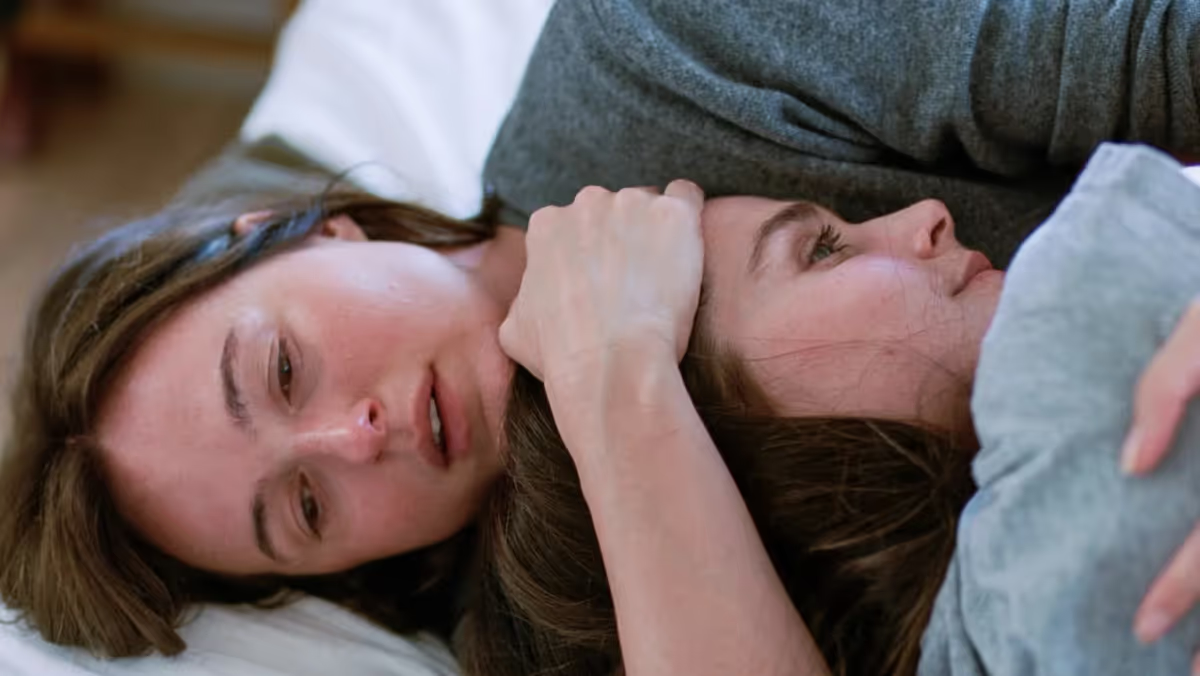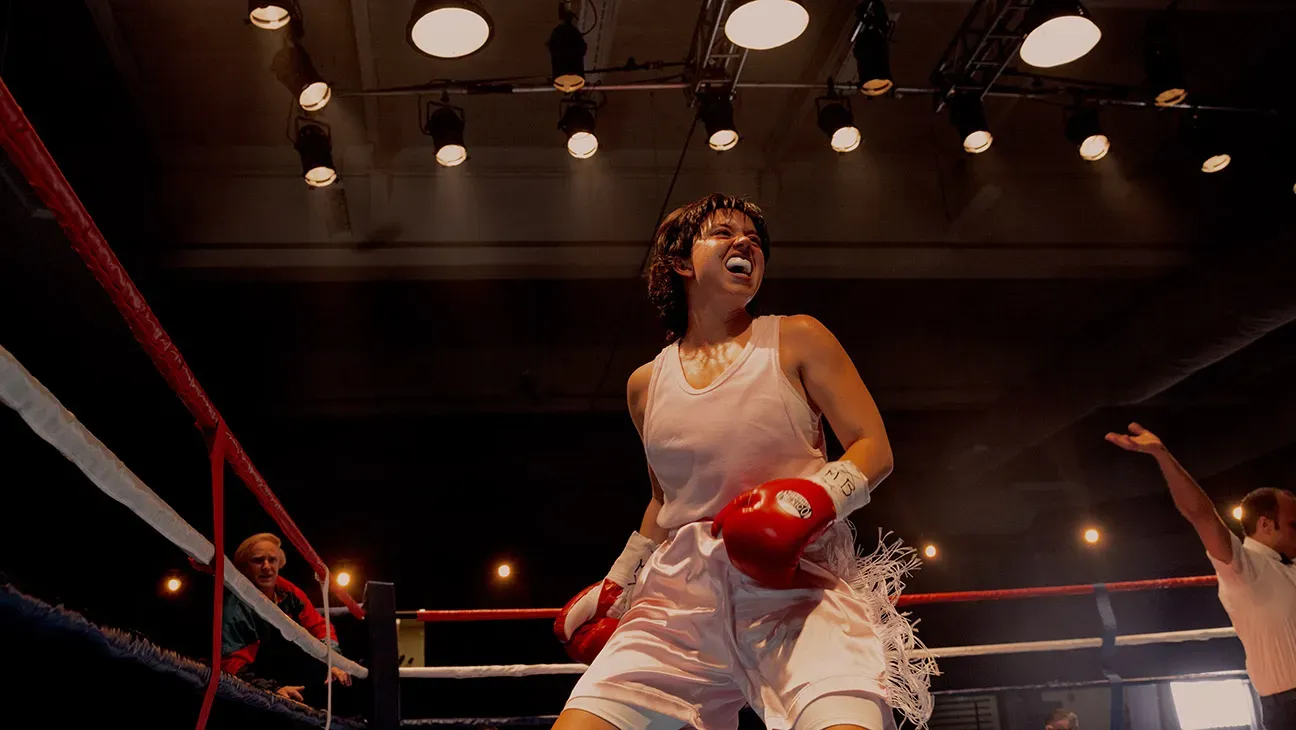In Review: ‘Sentimental Value,’ ‘Die My Love,’ ‘Christy’
Our second batch of new-release reviews includes a complex family drama, Jennifer Lawrence as a woman on the edge, and Sydney Sweeney suiting up for a boxing biopic.

Sentimental Value
Dir. Joachim Trier
133 min.
A house is not a home in Joachim Trier’s Sentimental Value, which opens with a young actress’s memories of a writing assignment she had as a child, where she had to describe the thoughts of an inanimate thing as if it were sentient and had feelings. She had chosen the lovely two-story house in Norway that her family had occupied for a few generations and described, quite precociously—her teacher gave her an “A”—how the place felt heavy with activity and light without it, and whether the house preferred one feeling over the other. We know from her essay that she’s experienced it both ways, most significantly in her parents’ stormy marriage, which ended with her father splitting for Sweden and her mother caring for her and her younger sister alone. Put simply, this is a broken home. And if that weren’t clear enough figuratively, Trier also supplies a giant crack that stretches from ceiling to floor, a “flaw” that guarantees its future collapse.
The Reveal is a reader-supported newsletter dedicated to bringing you great essays, reviews and conversation about movies. If you are not paid subscriber, we would love for you to click this button below and join our community.
Though the “broken home” metaphor signals a tidiness that the film can’t quite escape, there’s nonetheless an exceptionally fine-tuned depth and emotional range to Sentimental Value, which is carried over from his last feature, The Worst Person in the World, but expanded to a larger cast of characters here. Though abandonment, dysfunction, and loss are all themes that run through Trier’s script, they are not treated like an anchor that pins this family to a gray-lit Scandinavian destiny. They are more like imposing obstacles to be confronted, however many fresh messes and wounds are inflicted as a result of it. That crack in the foundation suggests the inevitability of a story that is, in fact, constantly in flux and it’s thrilling to watch Trier and his actors fumble their way through it.
After establishing the tone with a riveting setpiece where Nora (Renate Reinsve), a stage actress, works her way through a crippling case of opening-night stage fright, Sentimental Value shifts to a memorial at Nora’s childhood home, where her mother has recently passed. (Trier doesn’t go into the woman’s death much, but in one typically lovely grace note, a small taped-on reminder to turn off the stove suggests that she had some form of dementia in the end.) Nora’s more put-together younger sister Agnes (Inga Ibsdotter Lilleaas), who lives contentedly with her husband and their little boy, seems to regret her decision to cater the event herself, but the siblings manage it just fine. Yet they’re surprised and a bit shaken when their estranged father Gustav (Stellan Skarsgard), a notable film director, turns up and stays a while.
There are a couple of related bits of business that account for Gustav’s reemergence. For one, the house belongs to him, and it’s tied to his own haunted memories of his mother, who was tortured during World War II and exited his life prematurely, too. Gustav also comes bearing a personal script for a film he intends to shoot in the house, with a lead role intended for Nora, who’s so resentful of him that she doesn’t even read it. With his long-time producer having raised a budget through Netflix, Gustav opts to continue with a popular American actress, Rachel (Elle Fanning), and shooting in English rather than Norwegian.
Trier gives all four of these characters—and the actors who play them, all brilliant— the space to process their related sets of unsettled emotions. There are aspects of Nora that feel familiar from The Worst Person in the World, like her propensity for doomed relationships, but Reinsve suggests someone who is not merely disordered but quietly suffering. The scenes between Fanning and Skarsgard, where they try to work their way through a film role that neither of them can quite solve, are so full of feeling that they’re almost incidentally as sharp an illustration of the director-actor relationship as you’ll ever see. And then there’s the lesser-known (at least internationally) Lilleaas as Agnes, who emerges as the linchpin of the entire drama.
The title Sentimental Value pops up in the dialogue when Nora and Agnes are sorting through their mother’s things and figuring out what items they might want to take with them before packing everything up. But it’s a deceptive ploy on Trier’s part to have us thinking about a nostalgic attachment to, say, a pretty red vase when in fact there’s still unfinished business in this house. Sentimental Value has a hard-won optimism about it, holding out for the possibility that the relationship Nora, Agnes, and Gustav isn’t as calcified as their ages might have you assume. Gustav walked out of a house decades ago, but he’s trying to walk into a home. — Scott Tobias
Sentimental Value opens in limited release today.


Die My Love
Dir. Lynne Ramsay
118 min.
Few filmmakers have the imagination and moxie to pull off what Lynne Ramsay has attempted in nearly every film she’s directed, which is to find some visual language to express a person’s mental state. You can see it in Morvern Callar, her film about a young Glaswegian woman who awakes to her boyfriend’s dead body on Christmas morning and processes her grief over his suicide in mysterious ways, cued by the music from a mixtape that left for her. Though her follow-up, We Need to Talk About Kevin, concerns the aftermath of a horrific school massacre, it’s really more about the perpetrator’s mother and the guilt she carries over never feeling a connection to her son. And while You Were Never Really Here is ostensibly a neo-noir thriller about a man who tracks down missing girls for a living, his pursuit of vengeance circles back to a personal history of extreme trauma.
All three of those films are based on books—by Alan Warner, Lionel Shriver, and Jonathan Ames, respectively—and now Ramsay’s latest, the characteristically harrowing Die My Love, is spun off from Ariana Harwicz’s novel about a young mother on the edge of sanity. Ramsay has a special talent for making the internal external, turning cinema’s greatest liability into an asset. As Die My Love drifts (and oftentimes skids) around from scenes of domestic discord to vivid flashbacks, fantasies, and symbolic tableaux, Ramsay commits herself as much to reflecting one woman’s deteriorating mental state as she does to laying out pieces of a traditional narrative. There’s an intuitive artistry to the film that’s rare and at times extremely challenging, and the idea is to come away with a feeling more than a story that’s been told.
To make it work, Ramsay leans heavily on Jennifer Lawrence’s lead performance, which happens to be a shrewdly calculated bet, since Lawrence had already pulled off a woman-on-the-verge dry run for Darren Aronofsky’s underrated Mother!. In the opening scene, Grace (Lawrence) and her husband Jackson (Robert Pattinson) have made the move from New York to a, let’s say, “rustic” fix-’er-upper in rural Montana, where Jackson grew up. We don’t get a glimpse of what their lives in New York were like, but Grace, an aspiring writer, looks removed from her un-natural habitat. Grace and Jackson have a baby boy together, but her warmth toward the child can’t mask her uneasiness with motherhood, which grows more alarming as her isolation, loneliness, and exhaustion quickly hurtle her toward depression.
Though both films are about the withered psyches of women thrust into motherhood, Die My Love isn’t a tale of maternal ambivalence like We Need to Talk About Kevin, but almost its inverse, in that Grace is devoted to her boy but loses her grip on everything else. At times, the film feels a little overcranked, as it amps up Grace’s postpartum misery into a near-apocalyptic crisis, but more often there’s a great visceral charge to the madness that consumes her, because Ramsay expresses it in such arresting cinematic terms. Supported by a typically eclectic soundtrack—vintage tracks by Peggy Lee and Billie Holiday, the rock or new wave of Cream, Eels, David Bowie, and Cocteau Twins—Ramsay liberates herself to uncork bold montage sequences where past, present, fantasy, and reality collide in an exhilarating rush.
There’s a bit of an imbalance between Grace and Jackson that’s built into Die My Love, which is engineered toward Grace’s perspective, but the Jackson character suffers from the inattention and Pattinson’s erratic performance makes his swings that much harder to track. Yet Lawrence is a powerhouse, utterly committed to Grace’s knife’s-edge instability while still capable of humanizing flashes of comedy and tenderness. Grace’s connection with her mother-in-law Pam, played beautifully by Sissy Spacek, is particularly moving, because Pam understands her in a way that her son never could, even as she frets over Grace’s unhinged behavior. Die My Love is ultimately a more insightful film about motherhood than marriage, but the sheer force of Ramsay and Lawrence’s collaboration turn Grace into an essential woman under the influence. — Scott Tobias
Die My Love opens today in theaters everywhere. Like seriously. Everywhere.


Christy
Dir, David Michôd
135 min.
Knocking out opponents just seems to come naturally for Christy Martin (Sydney Sweeney), even if that ability might not be immediately apparent to those around her. Not particularly tall and, at least in the opening scenes of Christy not terribly intimidating, Martin nonetheless dominates the female division of the Toughman contents held near her West Virginia home. In one early moment of this biopic depicting Martin’s professional ascent and personal struggles, she’s a vision of uncontainable joy as director David Michôd (Animal Kingdom, The King) frames her against a glowing sunset as she revels in victory at the end of an outdoor match. The daughter of a family that expected little of her and whose conservatism forced her to conceal her sexuality, Martin has the look of a woman who’s finally found, as she puts it, her “thing.” But finding it is one thing. Keeping it will prove to be an altogether different sort of challenge.
In 1996, Martin became the first female boxer to appear on the cover of Sports Illustrated. In 2010, she made headlines again after her attempted murder at the hands of her coach and husband Jim Martin (played in the film by Ben Foster). Michôd’s film depicts both Martin’s unlikely rise and near-fall, a one-of-a-kind story Christy nevertheless tells in a familiar way. Or, more accurately, it tells in a couple of familiar ways, grafting elements of a boxing movie onto a sometimes harrowing depiction of a marriage that begins in compromise then curdles into toxicity, addiction, and abuse. In its best moments, including a harrowing late-film attack that recalls Star 80 in its unvarnished brutality, Michôd’s forceful direction overcomes a reliance on familiar biopic beats—the glamorous ascent, the warning signs of things to come, the bottoming out, etc. Martin’s life might be singular, but the film keeps making it seem like something we’ve seen before.
It’s Sweeney that sets it apart. Bulked up and glammed down, she’s borderline unrecognizable, particularly in the film’s early scenes before Martin’s team’s attempts to feminize her image. But Sweeney’s transformation is more than just physical. She’s convincing as both the scrappy kid no one expected to go anywhere and the swaggering superstar who began throwing verbal blows at opponents—including homophobic insults that helped allow her to stay in the closet—long before joining them in the ring. While other usually reliable actors like Foster and Merritt Wever, as Martin’s bible-thumping mom, struggle to make their reprehensible characters convincingly human, Sweeney disappears into the role of a woman whose gifts made her famous but also bound her to a stultifying life. For once, simply punching her way out wasn’t an option. —Keith Phipps
Christy is now in theaters.

Because of the overabundance of new releases this week we've split The Reveal's reviews into two installments. Click here for reviews of Train Dreams, Predator: Badlands, and Peter Hujar's Day.




Discussion